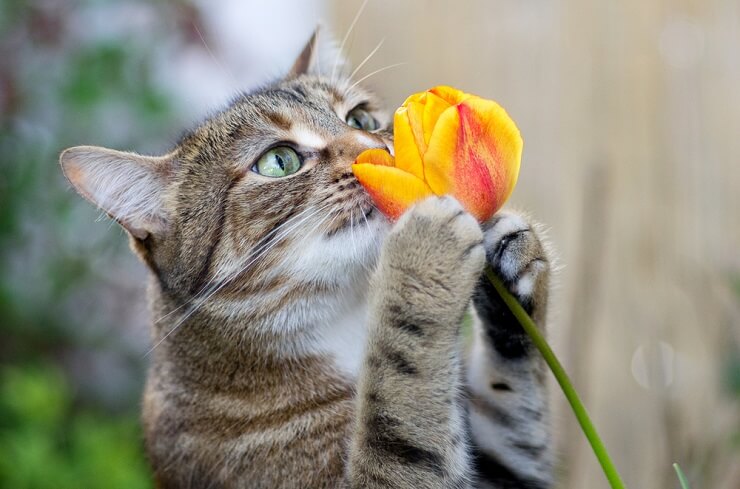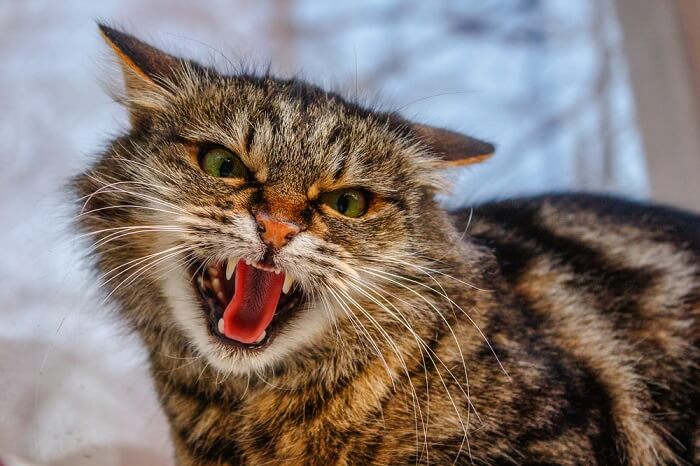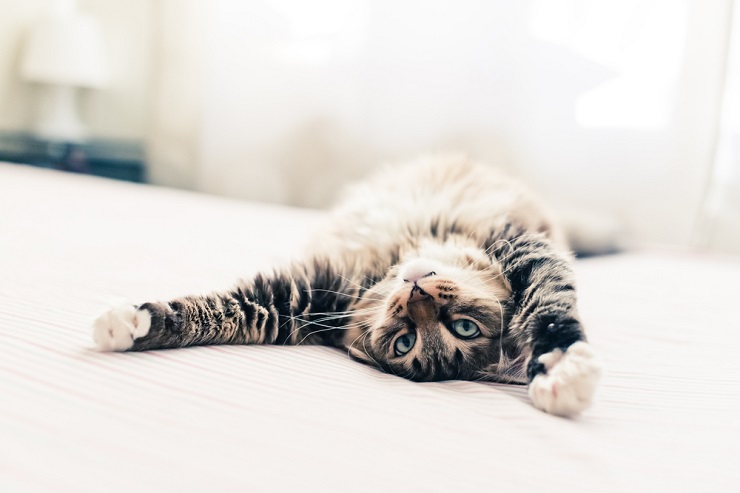What Smells Do Cats Hate? 9 No-No’s For Their Sensitive Noses
This page contains affiliate links. We may earn money or products from the companies mentioned in this post through our independently chosen links, which earn us a commission. Learn More
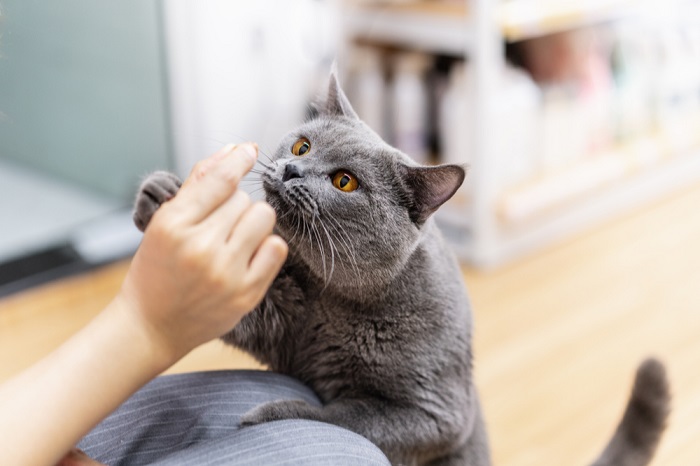
Unless we are talking about the smell of excrement, the human definition of a foul smell can vary significantly on an individual level. For some folks, the smell of alcohol is unbearable, while others enjoy it.
Cats are much more uniform in this sense (pun intended), as there is a clear-cut list of the top 9 smells cats hate, i.e. they will most certainly harm their sensitive noses.
A Soiled Litter Box
You might have noticed that a cat jumps out of the litter box as soon as it has finished its business. In this aspect, there is little difference between humans and cats, as we too rush to flush the toilet as soon as we are done.
This is a matter of hygiene, so cats, like their primate owners, share the innate feeling to stay clear of excrement, albeit their own.
If you are slow to clean the litter box, you will notice how the cat will refuse to use a dirty litter box. Even though cats, like dogs, burry their pee and smelly poo, the stringent smell still wards them off.
Strong Cleaners
If we were to place all household cleaning solutions in one place, we would be surprised by their scope and sheers numbers.
From toilet deodorizers to various cleaning agents, all cleaning products pack a punch in terms of smell. The smell of chemicals is strong for the human nose but for a cat’s nose, it’s unbearable.
Feline noses are sensitive to toxic chemicals, as these odors can irritate and damage their mucous membrane, both in the nose and inside the mouth. Strong cleaners should be kept out of reach of both cats and children.
Citrus
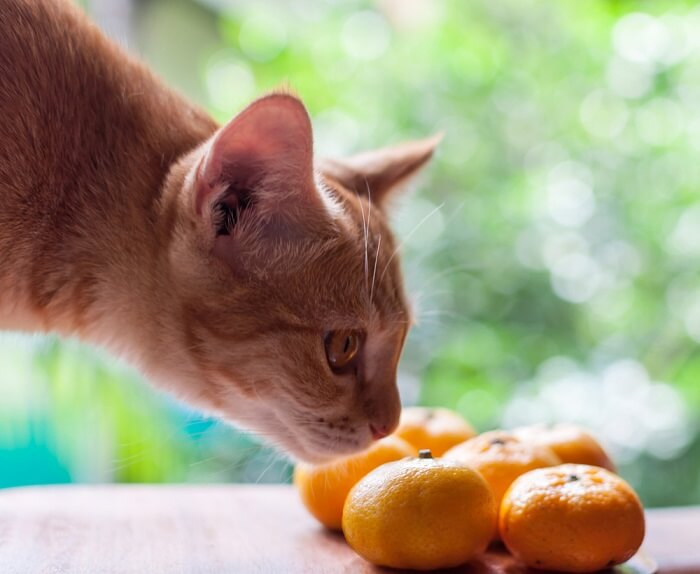
Moving onto more pleasant smells, don’t expect your fuzzy friend to help you make lemonade. Moreover, cats hate the smell of all citrus fruit, not just lemons. This is because a cat’s sense of smell is up to 14 times stronger than a human’s.
What is slightly discomforting and sour for us, is a huge deterrent for cats. This is for a good reason, as citrus fruit and especially oranges are toxic to cats. As a pet owner, you can use this to your advantage and place orange slices around all the “no-go” zones in the house.
Peppermint
From peppermint candy to mint tea, we humans find the scent of fresh mint refreshing. Well, your cat will beg to differ, as they find mint astringent, just like a citrus fruit. Again, mint and eucalyptus plants are toxic to cats, so they stay away from these odors.
The scent of menthol will irritate a cat’s nose, so don’t eat mint candy and get near your cat’s face. They hate mint ointments and mint tea just the same. If you grow organic mint, then better do it outside of the apartment or keep it on an elevated window sill where the cat can’t reach it.
Pine
Another smell that is a common freshener in our homes is pine. In fact, manufacturers put pine scent in everything from toilet gel to cat litter, so choose carefully which litter bag you pick up the next time you enter a pet store. Many cat owners have complained that their pets refused pine-scented litter!
Apart from pine, cedar is another coniferous tree that cats dislike. Its strong, sharp smell of wood doesn’t sit well with cats’ smell buds. If you let your cat go in the yard, you might notice it giving pine and cedar trees a wide berth.
Hot Peppers
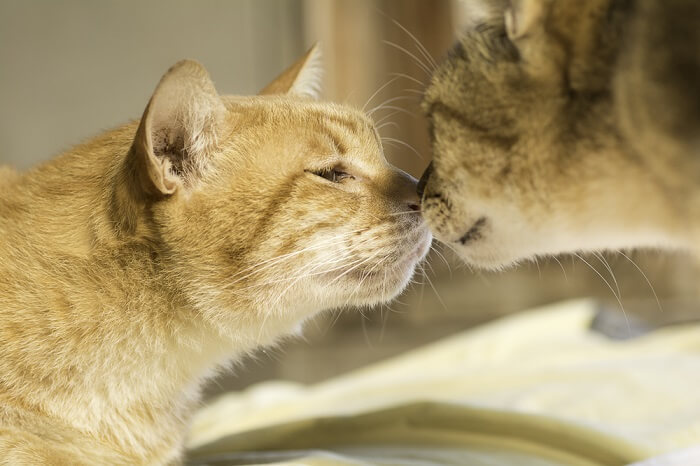
As humans try to climb the Scoville scale and eat chili peppers, cats are turning their heads away from hot peppers. In general, cats aren’t fond of spices and seasoned food, as it irritates their noses. You will seldom find chilly-flavored cat food, for instance.
When it comes to preparing homemade meals for cats or sharing your plate, be cautious that you don’t offer your four-legged friend seasoned meals, like the ones containing curry or mustard. Their noses will sense this and the animal will rebuff you.
Bananas
In the case of citrus fruit, one can understand why cats don’t like their smell. However, it may come as a surprise that bananas and their smell aren’t on the feline menu. Since the fruit is sweet and tasty, you have to look elsewhere for an explanation.
Namely, bananas are loaded with potassium,and potassium chloride is the main ingredient in numerous medications that cats dislike, to use a euphemism. Therefore, cats don’t hate bananas innately but they rather develop the disliking as they visit the vet.
Fish Gone Bad
Humans eat fish but cats adore it! This is nothing new but when the fish turns bad, not even cats will consume it. Moreover, they will most definitely be sick if you feed them rancid fish with milky flesh. If you wouldn’t eat smelly fish, why should your cat want to!
Other Cats
Any person who owns more than one cat knows that cats don’t like each other’s smells. Cats are territorial, so when you introduce another cat in the household, they will dislike its smell, as they will see the newcomer as a threat.
Each cat has a unique smell and the chances are high for the residential cat to start spraying the house with its smell to repel the newcomer. Luckily, this defensive mechanism wears off over time, as both animals learn to tolerate each other’s presence.
By asking yourself what smells do cats hate, you are showing genuine care for your pet cat. Once you realize how bad it is to forget to clean the litter box or buy pine-scented litter, you will make the cat’s life easier.
Heck, even you will benefit from this knowledge, as spreading banana peel over a certain section of the yard ensures your cat probably won’t venture there.
Frequently Asked Questions
What smell will repel cats?
The shortlist would include; pine, cedar, excrement, strong cleaning chemicals, bananas, citrus fruit (oranges in particular), hot peppers, other cats, spoiled fish, mint, etc.
What is a natural cat deterrent?
Citrus fruit, such as lemon and orange are excellent cat deterrents. The alternatives include banana peel, pine, mint, and strong chemical solutions, such as cleaners found in the household.

